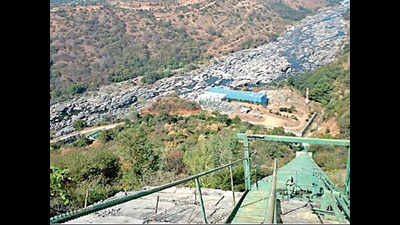- News
- City News
- bengaluru News
- Despite threat to jumbos, forest department goes ahead with mini-hydel project
Trending
This story is from January 29, 2019
Despite threat to jumbos, forest department goes ahead with mini-hydel project

BIODIVERSITY AT RISK: Shimsha river, next to which the project is planned, is the only water source for animals in this area during summer
BENGALURU: The controversial mini-hydel project in Kollegal taluk of Chamarajanagar district, which threatens to fragment a crucial elephant corridor and poses threat to biodiversity, has got the forest department’s nod. This, despite the project being rejected twice by the state wildlife board headed by the chief minister.
The project in question is the proposed expansion of Basaveshwara mini-hydel project located in survey no.1 of Shivanasamudra village, Kollegal taluk, Chamarajanagar.
Documents accessed by TOI show the project was first rejected during the state wildlife board meeting on September 11, 2015, headed by then CM Siddaramaiah. Earlier, on January 28, 2015, a sub-committee of the board also rejected the project citing various ecological reasons and illegalities involving the promoter. However, the forest department has now given permission to the same project.
An environmentalist said: “This project was also rejected by the regional office of the ministry of environment and forests (MoEF) during its meeting on April 13, 2018 on ecological grounds and in the backdrop of violations of acts and policies. Surprisingly, the same office has now permitted the project vide its letter dated August 16, 2018. They should have mandatorily taken the wildlife board’s approval.”
Threat to elephants and tigers
The project is 1.2km from the boundary of Cauvery Wildlife Sanctuary, environmentalists said. According to wildlife experts, the area is home to 11 species that are protected under Schedule I of The Wildlife Protection Act, including tigers, Asiatic elephants, honey badgers, oriental small-clawed otters, smooth-coated otters, rusty-spotted cats and Indian pangolins. “More importantly, the area is an important elephant habitat and there seems to be a spurt in human-elephant conflicts in recent years. One of the causes attributed to that is the loss of habitat and disturbance caused by mini-hydel projects in the area. The large pipeline laid to carry water also impedes movement of elephants,” said an expert.
Threat to endangered fish
Shimsha river, next to which the mini-hydel project is proposed, is the only source of water for animals in this area during summer. “The river is also an important habitat for Deccan Mahseer fish, whose numbers are declining due to various reasons, including blasting works and fragmentation of habitat. Deccan Mahseer return to their spawning grounds for breeding and relentless construction across rivers affects their movement and spawning,” said an environmentalist. Further, the fish are an important food source for otters.
The project in question is the proposed expansion of Basaveshwara mini-hydel project located in survey no.1 of Shivanasamudra village, Kollegal taluk, Chamarajanagar.
Documents accessed by TOI show the project was first rejected during the state wildlife board meeting on September 11, 2015, headed by then CM Siddaramaiah. Earlier, on January 28, 2015, a sub-committee of the board also rejected the project citing various ecological reasons and illegalities involving the promoter. However, the forest department has now given permission to the same project.
An environmentalist said: “This project was also rejected by the regional office of the ministry of environment and forests (MoEF) during its meeting on April 13, 2018 on ecological grounds and in the backdrop of violations of acts and policies. Surprisingly, the same office has now permitted the project vide its letter dated August 16, 2018. They should have mandatorily taken the wildlife board’s approval.”
TOI has learnt that based on a letter from MoEF, the principal chief conservator of forests, Karnataka, in a letter dated August 16, 2018, permitted the project proponent to proceed with it.
Threat to elephants and tigers
The project is 1.2km from the boundary of Cauvery Wildlife Sanctuary, environmentalists said. According to wildlife experts, the area is home to 11 species that are protected under Schedule I of The Wildlife Protection Act, including tigers, Asiatic elephants, honey badgers, oriental small-clawed otters, smooth-coated otters, rusty-spotted cats and Indian pangolins. “More importantly, the area is an important elephant habitat and there seems to be a spurt in human-elephant conflicts in recent years. One of the causes attributed to that is the loss of habitat and disturbance caused by mini-hydel projects in the area. The large pipeline laid to carry water also impedes movement of elephants,” said an expert.
Threat to endangered fish
Shimsha river, next to which the mini-hydel project is proposed, is the only source of water for animals in this area during summer. “The river is also an important habitat for Deccan Mahseer fish, whose numbers are declining due to various reasons, including blasting works and fragmentation of habitat. Deccan Mahseer return to their spawning grounds for breeding and relentless construction across rivers affects their movement and spawning,” said an environmentalist. Further, the fish are an important food source for otters.
End of Article
FOLLOW US ON SOCIAL MEDIA










